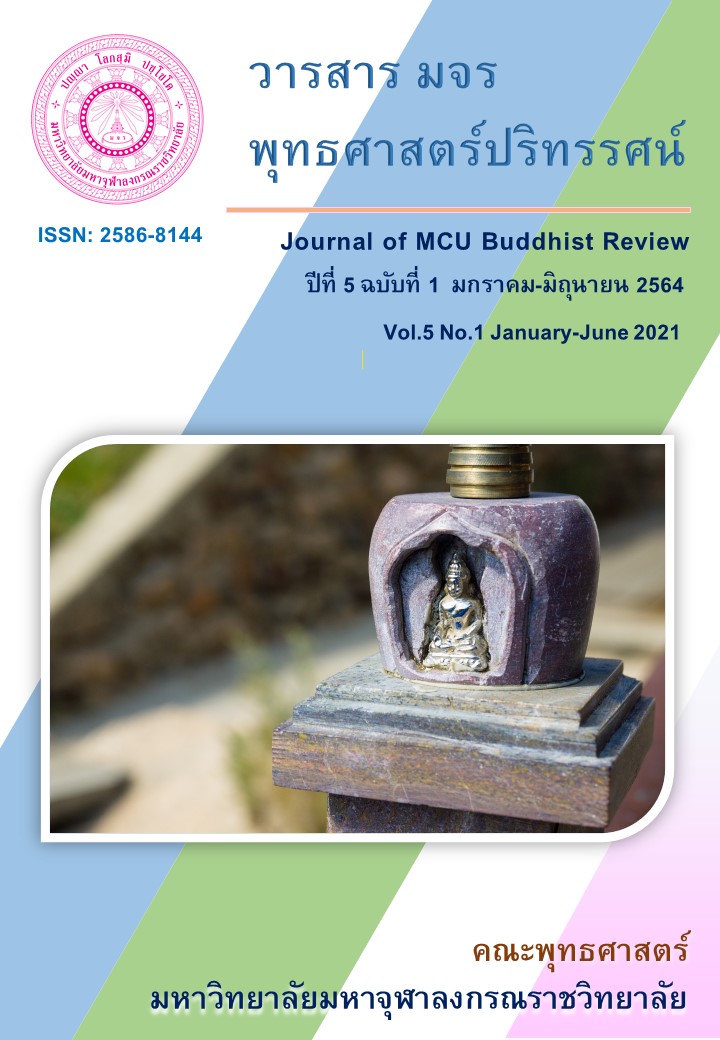พุทธสันติวิธีในฐานะเครื่องมืออยู่ร่วมระหว่างมนุษย์กับสัตว์อื่น: กรณีศึกษาสุนัขจรจัด
Main Article Content
บทคัดย่อ
บทความนี้มีวัตถุประสงค์เพื่อศึกษาแนวคิดเรื่องพุทธสันติวิธีในการอยู่ร่วมระหว่างมนุษย์กับสัตว์ และการพัฒนาพุทธสันติวิธีในการแก้ปัญหาสุนัขจรจัดในพระพุทธศาสนาเถรวาทด้วยการศึกษาเอกสาร จากการศึกษาพบว่าแนวคิดเรื่องพุทธสันติวิธีในการอยู่ร่วมระหว่างมนุษย์กับสัตว์มาจากองค์ประกอบภายในคือจิตใจที่พัฒนาจนเข้าใจตนเองและสามารถสร้างประโยชน์ต่อผู้อื่นได้ และพัฒนาองค์ประกอบภายนอกที่เกี่ยวข้องกับการแสดงออกของความเมตตาทางกายด้วยการให้ เพื่อระงับความอาฆาตมุ่งร้ายต่อกัน ทั้งยังเป็นการส่งเสริมให้เกิดความอยู่ร่วมกันด้วยดีกันทางสังคมอีกต่อหนึ่ง และทางวาจาอันแสดงผ่านการพูดและแสดงออกด้วยรูปแบบของการตกลงร่วมมือกันทางสังคมส่วนการนำพุทธสันติวิธีมาใช้ในการแก้ปัญหาสุนัขจรจัดมาจากการใส่ใจผู้อื่น เป็นการเชื่อมโยงจิตใจของตนเองกับผู้อื่นในฐานะของความเกี่ยวข้องกัน เป็นญาติ เป็นพี่น้อง หรือเพื่อนร่วมโลก และมีการเข้าใจความรู้สึกของผู้อื่นในฐานะที่รักสุขเกลียดทุกข์ไม่ต่างจากตนเอง ส่วนการแก้ปัญหาเน้นไปที่การให้ความรู้ ความเข้าใจแก่สังคม และมีการแสดงออกถึงการไม่เห็นด้วยกับค่านิยมของความเห็นแก่ตัวของผู้ทิ้งสุนัข และสังคมควรให้ความช่วยเหลือสัตว์ที่อยู่ในฐานะที่ช่วยเหลือได้ อีกทั้งมีการเสนอข้อกฎหมายเพื่อให้เกิดการลงโทษผู้นำสุนัขมาทิ้งอย่างจริงจัง
Article Details
- บทความที่ได้รับการตีพิมพ์เป็นลิขสิทธิ์ของวารสาร มจร พุทธศาสตร์ปริทรรศน์
- ข้อความใดๆ ที่ปรากฎในบทความที่ได้รับการตีพิมพ์ในวารสาร ถือเป็นความรับผิดชอบของผู้เขียนบทความ และข้อคิดเห็นนั้นไม่ถือว่าเป็นทัศนะและความรับผิดชอบของกองบรรณาธิการวารสาร มจร พุทธศาสตร์ปริทรรศน์
เอกสารอ้างอิง
มหาจุฬาลงกรณราชวิทยาลัย. (2539). พระไตรปิฎกภาษาไทย ฉบับมหาจุฬาลงกรณราชวิทยาลัย. กรุงเทพมหานคร : โรงพิมพ์มหาจุฬาลงกรณราชวิทยาลัย.
สมเด็จพระพุทธโฆษาจารย์ (ป.อ.ปยุตฺโต). (2553). จาริกบุญ-จารึกธรรม. พิมพ์ครั้งที่ 18. กรุงเทพมหานคร: ผลิธัมม์.
สมเด็จพระพุทธโฆษาจารย์ (ป.อ.ปยุตฺโต). (2561). การพัฒนาที่ยั่งยืน. พิมพ์ครั้งที่ 21. กรุงเทพมหานคร : ผลิธัมม์.
Peter Havey. (2000). An Introduction to Buddhist Ethics. Cambridge: Cambridge University Press.
NandasenaRatnapala. (1993).Crime and Punishment in the Buddhist Tradition. New Delhi: Mittal Publications.


